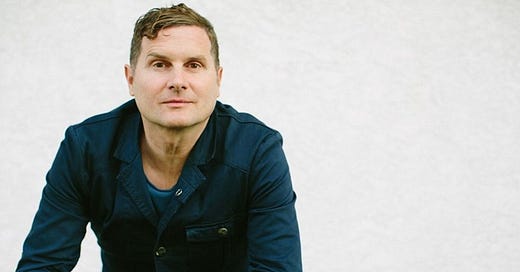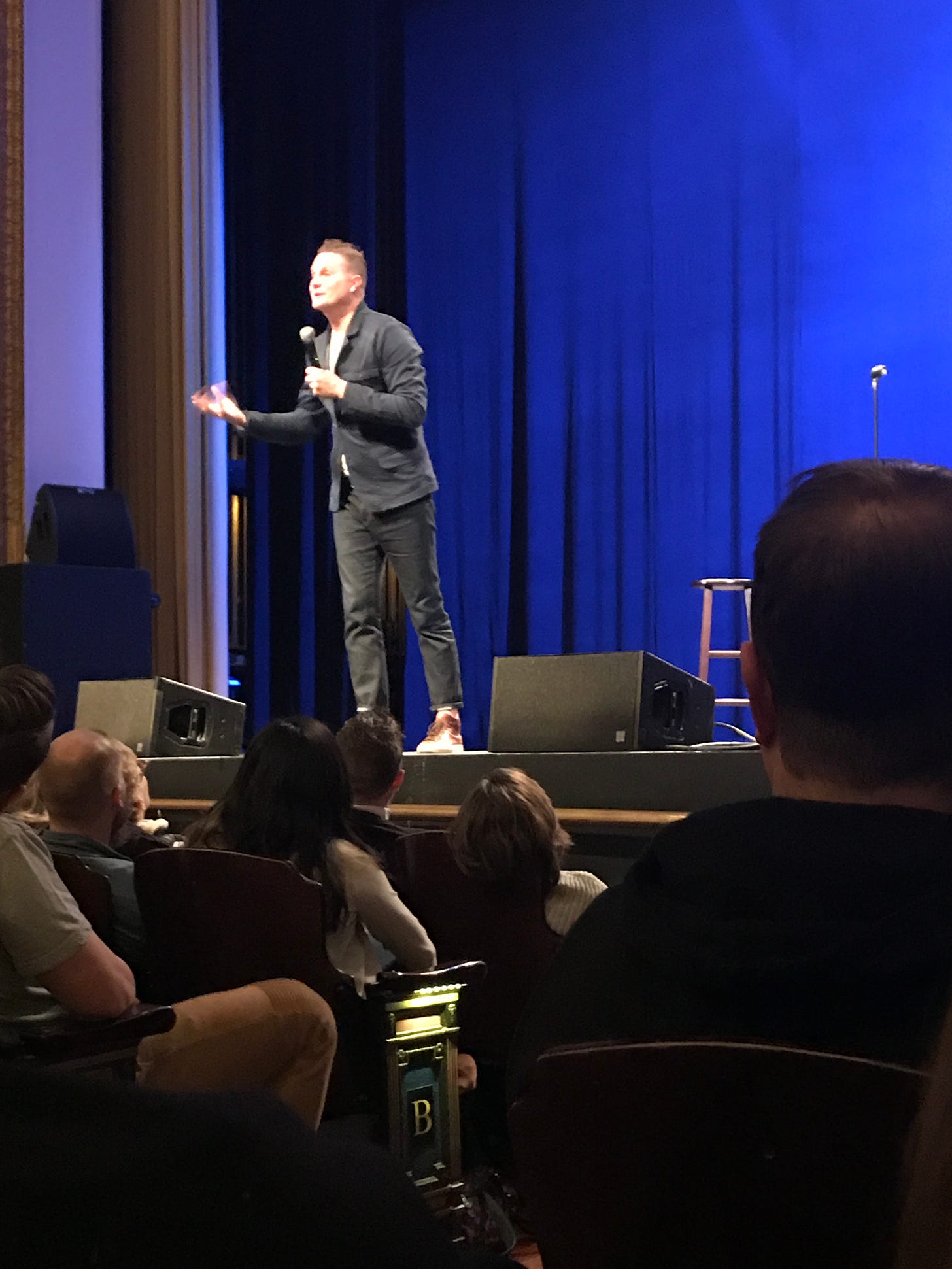It’s a gloomy day in Los Angeles. My two friends and I had driven through the night from Northern California in my 2007 Toyota Camry, buzzing with excitement; we were on our way to interview our biggest podcast guest yet. We pulled up to a sleek home in West Hollywood, and I punched in the backyard gate code (which, unbelievably, I had been given). And suddenly, there I was, a 22-year-old with a podcast audience of maybe 100 people, interviewing one of the most well-known religious figures of the 21st century, Rob Bell.
During this time, my faith was in a rough place. I was bitter, skeptical, and searching for something deeper than what I had encountered in my church experience. So obviously, I started a podcast. To my surprise, it was suspiciously easy to book big names. Our podcast may be the only one ever to have on Rob Bell, Matt Chandler, Congressman Ro Khanna, and Bob Goff. (The podcast even led me to meet Hillary Clinton, but that’s a story for another day.) At the time, I was drawn to voices that challenged the spiritual status quo. I was deconstructing, though in 2018, they just called it “backsliding.” And at the time, though few knew about it, it felt like my time in the Church, and maybe even with God, had an expiration date. Hence, Rob Bell felt like the ideal person for me to turn to.
But fast forward to today, my podcast is long over. I would go on to seminary, and somewhere along the way, I fell back in love with God and with the Church I once tried to subvert. And as far as Rob Bell, he now writes plays and gives two-day seminars for $600 a pop in Ojai, California. While I read the Church Fathers and ponder first-century Christology, Bell is painting his abstract sayings and shapes on wood planks. In many ways, we couldn’t be further apart. I’ve often wondered how, after intersecting for a brief period, we ended up in such different places.
This post is a bit different. It’s my faith journey told through Rob Bell’s. Or Rob’s told through mine. It’s a story about deconstruction, progressive Christianity, and coming back home.
An unbelievably young me (left) talking with Rob Bell in his backhouse
Bell’s Jewish Jesus
Like most people who attended youth groups in the mid-2000s, I was introduced to Rob Bell via the Nooma series, short videos that, in retrospect, feel like a less orthodox precursor to John Mark Comer’s Practicing the Way courses. In these videos, Bell made you think, feel, and experience the divine realm in a new way. And I was hooked. Bell’s style leaned into the tension of faith. He preached from obscure Old Testament passages, called out the Iraq War, and turned sermons into an art form.
Bell had a knack for knowing just enough to make you question what you’d always believed about God. He’d tell you to turn to Leviticus, bring out props, quote the Mishnah, tell a gut-wrenching story about the effects of American consumerism, and before you knew it, you were weeping at Leviticus. Bell’s style made you realize there was a context to Scripture that you’d always missed. Like most people who deconstruct, I loved this. It made me feel validated and superior. I knew something about God that others didn’t. While my friends in Acts 29 were obsessed with Luther and Calvin, I was all in on the Jewish Jesus, at least the version Bell claimed to know, one that felt closer to the original source.
I don’t know how else to explain this phenomenon, but there is a rush in calling Jesus a Rabbi instead of Christ, talking about his Jewishness in place of his divinity, explaining a random Greek word that makes people feel empowered, even enlightened. Bell’s preaching made me believe that the true divine experience is just behind a bit more context. So I started searching for more context…
The Holy Shift
The second time I hung out with Rob Bell was in 2019. My wife and I were planning a Spring Break trip to D.C., and I noticed Bell had a show there during that time. I sent him a quick email, and next thing I knew, there were tickets waiting for me at the box office and an invitation to come backstage. I walked in, passing none other than the Secretary of Education Betsy DeVos (yes, there’s a bizarre Rob Bell connection, look it up), and was greeted with a big hug and a warm, “Daniel, my brother.” Bell then spent 45 minutes with my wife and me, talking about life, God, and what might be next. We agreed to stay in touch and went our separate ways. What struck me at Bell’s shows was that they were sold out. People were paying $50 a ticket to hear a former pastor-turned-universalist who had become a full-time spiritual teacher with no congregation but himself. We were all drawn to his spiritual freedom, his ability to say whatever he wanted about God, to speak of faith in a way that felt boundless, untethered, and full of infinite spirit on the far side of fundamentalism.
And I have to admit, as a 23-year-old, I felt a rush to be a part of this crowd. I was hanging out with Rob Bell! He could call Oprah if he wanted. Before I knew it, I could be chatting it up with Richard Rohr or Greg Boyd. But alas, that is not how it would shake out.
After seeing Rob this time, I couldn’t help but get the sense that context was no longer enough for him. At his show that night, which he dubbed “The Holy Shift” tour (because, of course, he did), he talked about the idea of holiness. He mentioned everything from humpback whales to types of street tacos, but what was missing was God. And at this point, I was still deconstructing, so it didn’t bother me too much. But I noticed that Bell didn’t talk about any Jewish context or even the Bible. It was just about life, about finding holiness in your own context, not the first-century Jewish context he once sold me.
So I looked for the holy moments, the divine experiences in my daily life. But there really weren’t any. My life just wasn’t as exciting as Bell’s. My thoughts weren’t as profound as his. So there I was, in my twenties, searching for the true God without the Church, trying to find him by forsaking the very institution that led me to Him.
My iPhone 7 photo of Bell in DC
True Joy and Trader Joe’s
The last time I saw Rob was in late 2019. I found out he was coming to my hometown area of Fresno. So I shot him an email again, and we were on for a second podcast interview. But this time, I was in a different spiritual place. I was coming back to God and the local Church, and I had good mentors in my life. So I invited one of them to come on the podcast interview with me. As we made our way into the venue to meet with Rob, I was once again greeted with a “Daniel, my brother!” followed by a hug. But this interview felt different. In the first one, I ate up everything Rob said. In this one, I didn’t understand what he was saying. Rob did, or at least, he seemed to. It felt like Rob was preaching and surprising himself as he spoke, following up each of his own sentences with a “Yes!” or “That’s good.”
A moment came up in the interview where my mentor asked Rob what he was reading at the time. I think we both were eager to hear what he would say. Perhaps we were hoping to hear he was still reading N.T. Wright or Eugene Peterson. But he wasn’t. He listed a few pop psychology books and some work on atomic physics. We wrapped the interview, but I didn’t feel good about what had just happened. I felt like Bell had brought me on a journey, one he had already moved on from. We stayed for the show. The only difference was that it was half empty.
In this show, Rob spent the next hour explaining how his visits to Trader Joe’s and surfing skills were the essence of joy. I walked out of that theater, done, with Rob, with the show, with the spiritual path he had invited me down. Bell had sold me a vision of Jesus that was real, authentic, and closer to the genuine Jesus. He had led me to search for the divine, but by the end, he was telling me that true joy and the experience of the divine came from within, on the way to Trader Joe’s. It felt like the power of positive thinking, repackaged with a veneer of spirituality.
So I began my journey back to my conservative faith. I realized that Bell’s progressive Christianity led people to an abstract alternate universe where the morality of the inner person was the true God. I was too messed up for that. I needed a Cross. I needed a high priest who could sympathize with me, not a God who offered comfort in the aisles of Trader Joe’s.
Chasing Something We Always Had
I often find myself feeling a quiet sadness for Bell. He’s faded from the broader spotlight. These days, he uploads episodes of his podcast, the Robcast, speaking alone into a Yeti mic. He writes avant-garde plays with cryptic titles, performs stand-up, and dabbles in television. There’s an undeniable creative energy in it all, and I truly believe his drive still comes from a desire to liberate and uplift. But I can’t help wondering whether he realizes that he was once doing that, powerfully and clearly, in something as simple as the Nooma films.
In many ways, Bell and I sought an experience or a position that we already had. I wanted to experience God, so I sought to leave the very people who had led me to Him. Bell wanted influence, so he traded his true impact for a thinner version of it in the mainstream. It’s been years since I last spoke to Rob, and this reflection might sound triumphalist, but I truly don’t mean it to be. He was kind to me, generous, even, and I carry that with gratitude. Who knows, maybe if I ever find myself in West Hollywood, I’ll send him a message.







I'm all for keeping the church on track but when someone's main message is the Church has problems, it's my experience they are heading in a bad direction.
And when their message is basically, the church has problems and I alone am coming up with the solutions, they have already fallen, they just don't know it.
Because it always follows that they are beginning to create the church in their own image.
“I needed a high priest who could sympathize with me, not a God who offered comfort in the aisles of Trader Joe’s.”
Geez. Really? Rob is doing just fine. His ever deepening connection to joy and creativity and deep compassion for the human condition IS a true spiritual path—I’m sorry you can’t see that. More sorry that you feel compelled to call out someone publicly, throwing out snide remarks about his art and what he charges for his small group experiences…yuck.